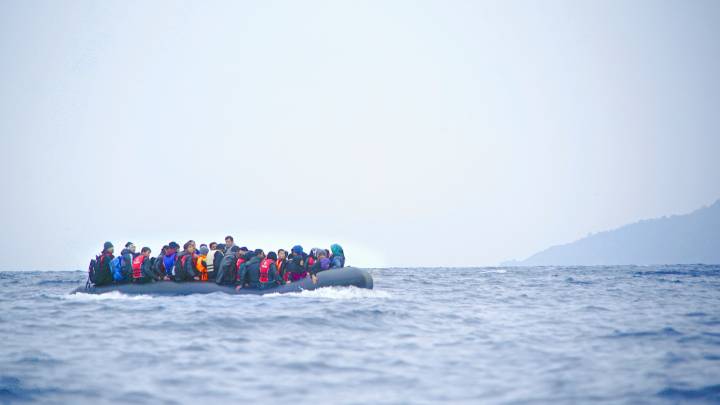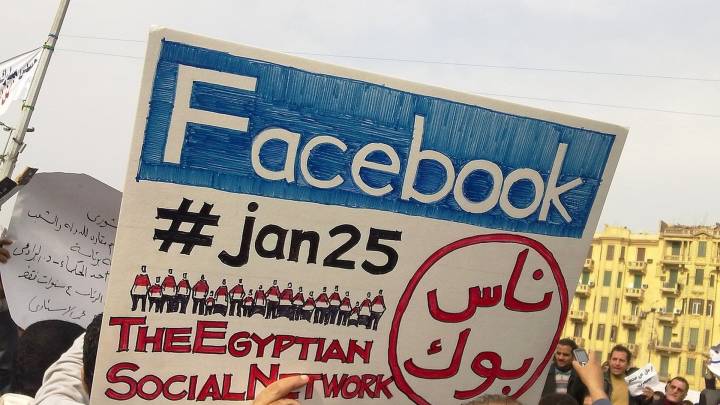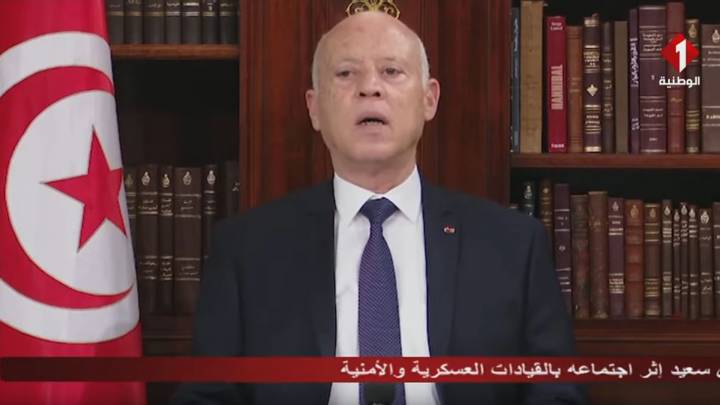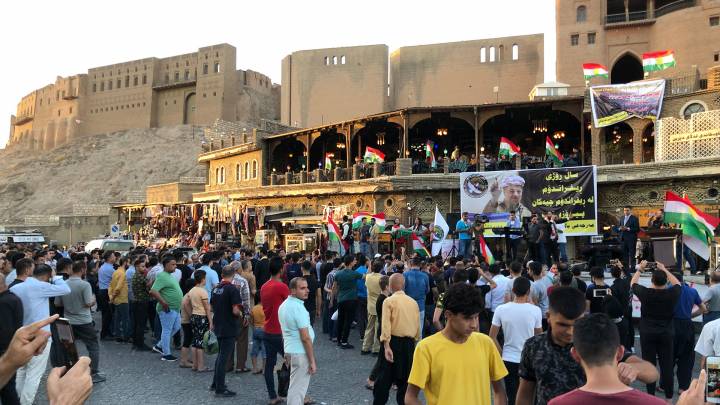At Tunisia’s only existing refugee centre, scores of illegal migrants are trying to move on from their cursed journeys through Libya.
A young woman is hanging out with her little daughter by the entrance to the office building of the Red Crescent centre in the southern town of Medenine. Looking toughened, exchanging a few fast words in English, she is ready to start telling how she ended up in Tunisia after fleeing her country more than a year ago. Back in Nigeria, Efosa, aged 28, worked as a beautician.
After getting married in 2015, she gave birth to her first-born child, Desmond. When her father-in-law passed away, she found out that he belonged to the Ogboni group, a “secret society” indigenous to the Yoruba people. It soon turned into a family dispute by the time her husband’s family pressured him heavily to become an Ogboni member since there was an expectation that their progeny would join the society. Until one day, her spouse, who had graduated from university, went out looking for work in Abuja, then disappeared.
“For months, his relatives were telling me to go and find my husband, blaming me for not knowing his whereabouts, even accusing me of hiding him”, she recalls. “They persecuted me for two years, threatened to take my little boy and forcefully induct him as member if I didn’t find my spouse”, she adds. It was in August 2017 when she decided to migrate with Desmond, 2 years old then, and her baby girl Domino. Without a plan on where to go, the young Nigerian got help from one customer at her beauty salon, who was involved in the food trade business with Libya. She offered to travel with her and a stay in an apartment in Tripoli.
The options to get out of detention centres in Libya are either running away, paying a ransom, or being sold as slaves
In her early days in the Libyan capital, on the way to the food store where her host was working, she was stopped by four men in a car who were repeatedly asking for her passport and talking to her in Arabic. Next, she was taken to the Tajoura detention centre where she spent four months.
“I was behind bars along with around 1,000 others, jammed into a hall, with mattresses on the floor, a sink and an open smelly toilet for everybody”, she recounts with a deep sigh, “they would hardly give you food except for a small bread roll with cheese and a plate of dry spaghetti. I sometimes had to beg the prison guards for a little more to feed my kids. I was mistreated, beaten, and forced to have sex several times. You can’t argue, or they will kill you”, she continues.
The options to get out of such detention centres are either running away, paying a ransom, or being sold as slaves. When sold into slavery, someone would come and pay the prison to release the inmate. Often migrants are forced to work off the debt. While trying to find a way to escape, Efosa was later picked up by one lady who was looking for a nanny and a housekeeper. She was thus sold with her children for 600 Libyan dinars. roughly 432 US dollars, altogether and freed in December last year.
Efosa worked for the lady who bought her for two months until she made up her mind on leaving Libya by any means. After explaining her situation and crying for help, she was connected with her employer’s brother, a migrant smuggler. On 25th January, she embarked on a boat with her two children heading towards Europe. When she will make it to her destination, she would have to pay off her debts in full.
The International Organisation for Migration (IOM) puts at 9,300 the number of people being held in official detention centres in Libya
During the sea crossing, water started leaking in when the SOS Mediterranean ship came to the rescue. Efosa was taken with her baby girl Domino on a helicopter, but she lost sight of her son who remained on the boat. After going into coma after drinking seawater, she woke up in a hospital in Sfax, in southern Tunisia. Her daughter was still with her, though there was no trace of Desmond who’s now believed to be in Italy. To date, the Italian Red Cross is searching for him.
“My future depends on my son, I don’t feel ok with him gone missing”, she utters in a mix of anger and sadness while Domino was showing a picture of her brother on her smartphone. “I won’t go back home without my Desmond, and I don’t want to go through Libya again!”, she also says, feeling stuck. Libya is a final stopover for many people from across Africa taking long, dangerous journeys for refuge in Italy or onward in Europe.
The International Organisation for Migration (IOM) puts at 9,300 the number of people being held in official detention centres in the conflict-ridden country, many of which are under the control of militias, with thousands more held in informal detention facilities run by armed groups or smugglers and human traffickers. Migrants are taken to the centres while passing through the North African country, or after being intercepted by the Libyan coastguard as they try to reach Europe by sea.
Earlier this year, the UN Human Rights Council reported that migrants in Libya have been bought and sold at “open slave markets”. In 2017, a CNN investigation revealed footage of what appears to be African migrants being auctioned off, which caused international outrage.
Opened in 2013, the Red Crescent shelter in Medenine is hosting two hundred men and women, most of them come from sub-Saharan African countries
Well before the CNN's footage was released, Medenine’s migrant centre was receiving more and more testimonies from migrants being traded as commodities and being sold into bonded labour (otherwise deemed modern slavery). The Red Crescent group in Medenine runs the only facility in Tunisia for migrants who reached the country illegally, either fetched by authorities near the border with Libya, or saved at sea off the country’s coast, or even transiting from Tunis to get to Europe via Libya.
Opened in 2013, the Red Crescent shelter is hosting two hundred men and women, most of them come from sub-Saharan African countries. With limited capacity, the three-storey building is overcrowded with half the number of beds needed, some people sleep in the corridor or in the TV room, there are three kitchens and bathrooms for everyone. “We’re negotiating with the IOM to enlarge the structure and create a separate foyer for women and children”, said Mongi Slim, the southern Tunisia director for the Red Crescent, “it will enable us to better receive people and provide a safe, private space for ladies”.
A weekly food allowance of 30 Tunisian dinars ($10) for each person covers basic dietary intake. With part of its funding stopped at end of May 2018, the voluntary-run centre is struggling to secure a minimum of 200,0000 dinars ($68,000) needed to cover its annual costs.
The centre also provides medical assistance and follow-up, psychological support where needed. “Because we are the only centre to receive migrants in the whole country, authorities systematically redirect those in need for humanitarian help here”, Slim observed. At the Red Crescent centre, migrants have 60 days to decide whether to voluntarily return to their home countries or to stay in Tunisia. Those who remain ultimately aim to travel onwards to Europe. IOM Tunisia chief of mission Lorena Lando estimated in July last year that there were 75,000 migrants and 777 refugees in Tunisia.
Leaning against a wall in the entrance hall of the Tunisian shelter, there is a woman with a lost look in her eyes appearing tired. Sara, 29, fled Ivory Coast over a year ago. Things took a bad turn for her in 2011 when her husband was forcedly disappeared during the country’s political crisis after a disputed presidential election.
Sara was put on a vehicle and told that she would get her money at a different location, with no mention of where she was being taken to. She soon found out that this was a trap
Left alone with her three children, she received a marriage proposal from an old man who required her to undergo female circumcision prior to the wedding. So she ran away from him. “During the conflict, the men who had kidnapped my husband threatened me with death”, she uttered. Although relative stability was restored in the years since the fighting ended, the young single mother faced aggressions, threats and pillaging at home. “Youth groups came armed with knives asking for money on different occasions”, she told showing old cuts and wounds on her arms.
As she felt her life was in danger, in 2017, she handed her kids to her best friend, and flew from her homeland for Tunis where she worked for an Ivorian lady as a maid for one year. However, her boss withheld her passport, telephone and earnings. Sara was put on a vehicle and told that she would get her money at a different location, with no mention of where she was being taken to. She soon found out that this was a trap. She was driven to the Tunisian-Libyan border, and forced to walk across the desert to Libya. In Tripoli, she was taken to prison by Libyan police.
“I was hit, raped and tortured”, she said remembering her detention time, “I was left without food and water for days. We often drank seawater or water from the toilet”. After four months, she attempted to escape, though unsuccessfully. “Once I was brought back, I was raped by different men and tortured again”, she carries on looking down, “because I was already pregnant [from previous sexual abuse] I had an abortion as a result of the beatings”.
“I thought to myself: If I have to die, I will die here. I can’t take Libya anymore!”
A month later, she tried again and broke out of prison with other women fugitives. She reached Zuwara where she was caught and detained again but managed to run away after a week. With a group of migrants, she walked through the desert toward Tunisia. However, Tunisian authorities nearby took them to court in Ben Guerdane where they were put on fast trial and ordered to return to Libya.
Left by the border again, she found herself in the desert with four fellow migrants, staying there three days with no water. While the others made their way back to Libya, she refused to go with them. “I thought to myself: If I have to die, I will die here. I can’t take Libya anymore!”, she sighed.
Finally, she found a young man who was heading to Tunisia and asked him to walk her safely to the same destination. Once she made it to the Tunisian side, out of the desert, she stopped a taxi and rushed to the Red Crescent foyer where she has now stayed for a month. She shows barbed-wire scars on her legs from crossing the desert. She now hopes to restart her life and to be reunited with her three children one day.
Waiting outside the office of Medenine’s centre, a young man hinted he was willing to share his story. 18-year old Samuel, from Ivory Coast, has lived through harsh times despite his young age. His father disavowed paternity and left his mother in financial strain with six children to raise.
The eldest son in the family, driven by a sense of responsibility, he moved out of his country in 2013 to find a better life and help his mother. Going from Burkina Faso to Algeria in search for better paid work, he was struggling to make a living as a footballer. The little money he was earning from casual jobs was just enough for himself. Later, he was saving up to move to Libya to then travel to Europe.
Overcrowding, deprivation of water and food, physical mistreatment, torture and forced labour are common features detention facilities in Libya
In 2016, he paid a smuggler 1,000 Euro to cross into Libya. Once arrived, an armed gang came and drove him to the detention centre of Sabratha where he spent more than a year and a half. “We were around a hundred men crammed into a cell, no chance to go out. We used to eat and drink water every three days. If we asked for more food, we were beaten”, he tells. His memories have not faded.
“There was no toilet. We would urinate and shit where we slept”, he went on. “Like my fellow inmates, I was insulted and tortured morning, midday and night, to extort money from me or demand ransom from my relatives. They demanded over 500 Euro for my release”, he continues to recount his ordeal.
Then the day came when Samuel broke free from jail with other detainees. Some of them were shot dead by guards as they were on the run. “I was running and running, focussed, with one thought: either I die or I live”, he says. After taking refuge in the house of a Nigerian man in Sabratha, he stayed with him and worked casually for a few months, sometimes without getting paid.
The young Ivorian has a clear goal in mind: “I must do all I can to leave this country”. Worn out by his experience in Libya and eager to find a stable place to move to, reaching Europe was no longer his plan. He saved up the right sum to get him out and reach Tunisia by land. “Crossing the desert is risky, too. There are Libyans scattered across the area who can kidnap and put you back in a detention camp”, he notes. At last, his journey went smoothly and when he entered Tunisian territory, the authorities referred him to the migrant shelter in Medenine.
The accounts given here are in line with a bulk of the reporting by humanitarian and human rights organizations on the mistreatment of migrants in Libyan detention centres. Increasing overcrowding, deplorable inhumane living conditions such as deprivation of water and food, physical mistreatment, torture and forced labour are common features of these facilities which humanitarian workers have limited access to.
Since Libya descended into chaos after the 2011 overthrow of Libyan leader Muammar Gadhafi, ongoing fighting between rival militias has engulfed the country. The resulting state of lawlessness has enabled armed groups, criminal bands, smugglers and traffickers to control much of the migrant flow. “My mother is now more reassured since I’m out of Libya. At least, she can sleep at night. Never again in Libya!”, concluded Samuel.





